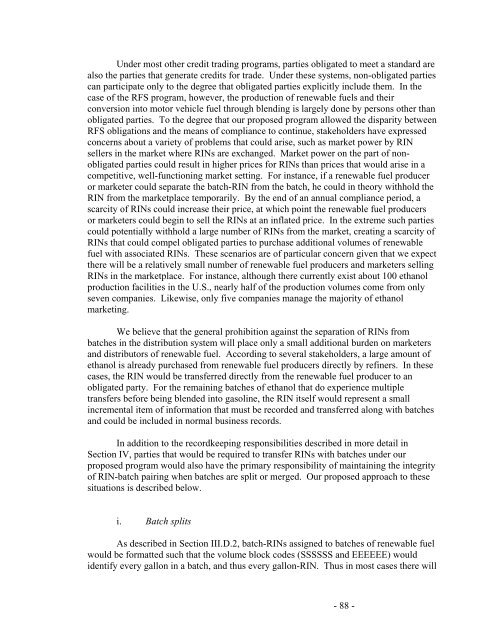Regulation of Fuels and Fuel Additives: Renewable Fuel Standard ...
Regulation of Fuels and Fuel Additives: Renewable Fuel Standard ...
Regulation of Fuels and Fuel Additives: Renewable Fuel Standard ...
Create successful ePaper yourself
Turn your PDF publications into a flip-book with our unique Google optimized e-Paper software.
Under most other credit trading programs, parties obligated to meet a st<strong>and</strong>ard are<br />
also the parties that generate credits for trade. Under these systems, non-obligated parties<br />
can participate only to the degree that obligated parties explicitly include them. In the<br />
case <strong>of</strong> the RFS program, however, the production <strong>of</strong> renewable fuels <strong>and</strong> their<br />
conversion into motor vehicle fuel through blending is largely done by persons other than<br />
obligated parties. To the degree that our proposed program allowed the disparity between<br />
RFS obligations <strong>and</strong> the means <strong>of</strong> compliance to continue, stakeholders have expressed<br />
concerns about a variety <strong>of</strong> problems that could arise, such as market power by RIN<br />
sellers in the market where RINs are exchanged. Market power on the part <strong>of</strong> nonobligated<br />
parties could result in higher prices for RINs than prices that would arise in a<br />
competitive, well-functioning market setting. For instance, if a renewable fuel producer<br />
or marketer could separate the batch-RIN from the batch, he could in theory withhold the<br />
RIN from the marketplace temporarily. By the end <strong>of</strong> an annual compliance period, a<br />
scarcity <strong>of</strong> RINs could increase their price, at which point the renewable fuel producers<br />
or marketers could begin to sell the RINs at an inflated price. In the extreme such parties<br />
could potentially withhold a large number <strong>of</strong> RINs from the market, creating a scarcity <strong>of</strong><br />
RINs that could compel obligated parties to purchase additional volumes <strong>of</strong> renewable<br />
fuel with associated RINs. These scenarios are <strong>of</strong> particular concern given that we expect<br />
there will be a relatively small number <strong>of</strong> renewable fuel producers <strong>and</strong> marketers selling<br />
RINs in the marketplace. For instance, although there currently exist about 100 ethanol<br />
production facilities in the U.S., nearly half <strong>of</strong> the production volumes come from only<br />
seven companies. Likewise, only five companies manage the majority <strong>of</strong> ethanol<br />
marketing.<br />
We believe that the general prohibition against the separation <strong>of</strong> RINs from<br />
batches in the distribution system will place only a small additional burden on marketers<br />
<strong>and</strong> distributors <strong>of</strong> renewable fuel. According to several stakeholders, a large amount <strong>of</strong><br />
ethanol is already purchased from renewable fuel producers directly by refiners. In these<br />
cases, the RIN would be transferred directly from the renewable fuel producer to an<br />
obligated party. For the remaining batches <strong>of</strong> ethanol that do experience multiple<br />
transfers before being blended into gasoline, the RIN itself would represent a small<br />
incremental item <strong>of</strong> information that must be recorded <strong>and</strong> transferred along with batches<br />
<strong>and</strong> could be included in normal business records.<br />
In addition to the recordkeeping responsibilities described in more detail in<br />
Section IV, parties that would be required to transfer RINs with batches under our<br />
proposed program would also have the primary responsibility <strong>of</strong> maintaining the integrity<br />
<strong>of</strong> RIN-batch pairing when batches are split or merged. Our proposed approach to these<br />
situations is described below.<br />
i. Batch splits<br />
As described in Section III.D.2, batch-RINs assigned to batches <strong>of</strong> renewable fuel<br />
would be formatted such that the volume block codes (SSSSSS <strong>and</strong> EEEEEE) would<br />
identify every gallon in a batch, <strong>and</strong> thus every gallon-RIN. Thus in most cases there will<br />
- 88 -
















